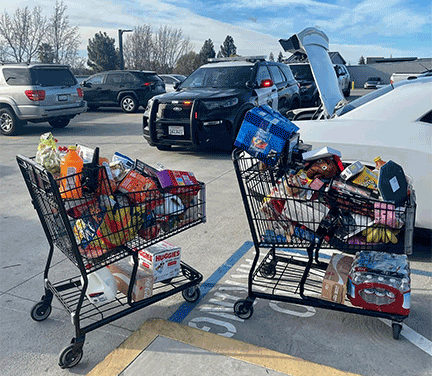Over 200,000 California voters have signed petitions to place the measure that will stop theft and fentanyl crimes onto the November 2024 ballot
Sacramento, Calif., — Californians to Reduce Homelessness, Drug Addiction, and Theft announced today that in less than 30 days, 214,000 California voters have signed the petition to place the Homeless, Drug Addiction, Retail Theft Reduction Act on the November 2024 ballot.
“We have seen a record number of voters seeking to sign the petition to place this measure on the ballot – sometimes waiting in line to do so,” said campaign chair Greg Totten who is also chief executive officer for the California District Attorneys Association. “This is consistent with polling that has shown that 70% of likely California voters support the Homeless, Drug Addiction, Retail Theft Reduction Act. The measure is commonsense and injects accountability back into our laws for repeat offenders of theft and for crimes involving fentanyl and other serious drug crimes.”
A survey of likely California voters found that 70% of voters support the title and summary of the Homeless, Drug Addiction, Retail Theft Reduction Act. The overwhelming support was consistent across every demographic and geography including the Bay Area and Los Angeles. Furthermore, 89% of likely voters support amending Proposition 47 for stronger penalties for those engaged in repeated retail theft and trafficking hard drugs like fentanyl. The measure also includes incentives to complete drug and mental health treatment for people who are addicted to hard drugs. The survey was conducted online from November 8-November 13, 2023, with a margin of error of +/- 2.28%.
To qualify the measure for the November 2024 ballot, the law requires 546,651 valid signatures. The campaign is required to notify the Secretary of State after 25% of the signatures from California voters have been collected.
Editors Note:
Initiative Could Reverse Prop 47 While Increasing Some Penalties
An initiative aimed at increasing penalties for drug and theft crimes while reversing parts of Prop 47 is now in circulation.
The move comes after approval by California Secretary of State Shirley Weber said the initiative can now begin collecting signatures—they need to collect signatures of 546,651 registered voters.
This measure will:
- Provide drug and mental health treatment for people who are addicted to hard drugs such as fentanyl, cocaine, heroin, and methamphetamine.
- Add fentanyl to existing laws that prohibit the possession of hard drugs while armed with a loaded firearm.
- Add fentanyl to existing laws that prohibit the trafficking of large quantities of hard drugs.
- Permit judges to use their discretion to _sentence drug dealers to state prison instead of county jail when they are convicted of trafficking hard drugs in large quantities or are armed with a firearm while engaging in drug trafficking.
- W am convicted hard drug dealers and manufacturers that they can be charged with murder if they continue to traffic in hard drugs and someone dies as a result.
- Reinstate penalties for hard drug dealers whose trafficking kills or seriously injures a drug user.
- Increase penalties for people who repeatedly engage in theft.
- Add new laws to address the increasing problem of “smash and grab” thefts that result in significant losses and damage, or that are committed by multiple thieves working together.
- Reducing Homelessness Through Drug and Mental Health Treatment
This proposal takes a modest step in the direction of these states by enacting a new class of crime called a “treatment-mandated felony.” Under this new “treatment-mandated felony,” prosecutors would have the discretion to charge a felony for hard drug possession after two previous drug convictions. If charged with this “treatment-mandated felony” for a third or subsequent drug offense, the offender would be given the option of participating in drug and mental health treatment. If the offender successfully completes drug and mental health treatment, the charge would be fully expunged, and the offender would receive no jail time. If the offender refuses drug and mental health treatment, they would serve jail time for hard drug possession. For a second conviction of the treatment- mandated felony (the 4 th total conviction for hard drug possession), a judge would have the option of imposing time in jail or state prison. Along with hard drug and mental health treatment, offenders charged with a treatment-mandated felony would be offered shelter, job training, and other services designed to break the cycle of addiction and homelessness.
Cracking Down on Hard Drug Dealers
- This Act would authorize greater consequences for hard drug dealers whose trafficking kills or seriously injures a person who uses those drugs, and it would provide a mechanism to warn convicted hard drug dealers and manufacturers that they can be charged with murder if they continue to traffic in hard drugs and someone dies as a result
- This Act would add non-prescription fentanyl to an existing list of hard drugs such as heroin, cocaine, and methamphetamine, for which it is illegal to possess the drug while armed with a loaded firearm
- This Act would also add non-prescription fentanyl to an existing list of hard drugs such as heroin, cocaine, and methamphetamine that authorizes greater consequences for drug dealers who sell large quantities of hard drugs.
- This Act also permits judges to sentence drug dealers who traffic in large quantities of hard drugs or who are armed with a firearm while trafficking in hard drugs to state prison instead of local county jails. Only our state prisons are equipped to manage security for hardened drug dealers and to provide them the rehabilitation services they need to safely re-enter society.
Accountability for Repeat Theft and Smash and Grab Thefts
- Under this Act, an offender with two prior convictions for theft can be charged with a felony, regardless of the value of the stolen property. Diversion programs will continue to exist, meaning that judges will retain discretion not to incarcerate an offender even for more than two theft convictions. But prosecutors will have the ability to bring felony charges against hardened, repeat offenders who continue to engage in theft. Judges will have the discretion to sentence a repeat offender to jail in appropriate cases, or to state prison if an offender is convicted four or more times of theft.
- This Act also authorizes judges to exercise their discretion to impose an enhanced penalty when an offender steals, damages, or destroys property by acting together with two or more offenders or by causing losses of $50,000 or more. By permitting discretion in these scenarios, judges will be able to fashion sentences that are appropriate for the crime committed, including so-called “smash and grabs” committed by mobs or large groups of people working together.
- The value of property stolen in multiple thefts will be permitted to be added together so that in appropriate cases an offender may be charged with felony theft instead of petty theft. This provision addresses the problem of offenders who commit a series of thefts in which the property stolen during each theft has a value under the $950 felony theft threshold, in order to insulate themselves from felony charges.
- Along with the hard drug provisions in this Act, these theft law changes will stop the vicious cycle of hard drug users stealing to support their habits without legal consequences for their actions.

